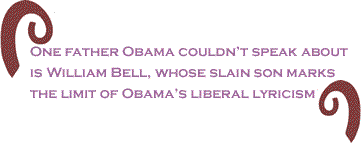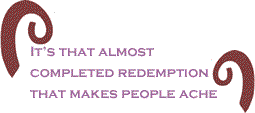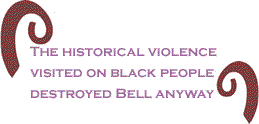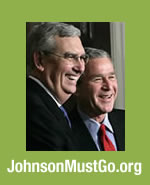
|
||||||||||||||||||||||
 |
||||||||||||||||||||||
 |
||||||||||||||||||||||
 |
||||||||||||||||||||||
 |
||||||||||||||||||||||
 |
||||||||||||||||||||||
 |
| The current issue is always free to everyone |
|
|
 |
On Father’s Day, two black
men passed each other. One stepped into glory, the other emerged
from his grief. The former was Sen. Barack Obama, who took the
pulpit at Obama began his Father’s
Day speech, “If we’re honest with ourselves, we’ll admit too
many fathers are missing.” His loosed a cascade of archetypal
scenes of black pathology; gunfire at night, boys on corners
or in jail, each image ended with a plaintive “how many?” He
demanded black fathers come off the streets, come back home,
turn off “ Obama’s biography guaranteed his words. His father abandoned him leaving a shared “blackness” to cover up the absence. Yet his speech succeeded not because of his sincerity but the passion of his listeners. The black middle class needs him to speak their anger. They laughed bitterly over Chris Rock’s 1996 routine “Niggas Versus Black People”, nodded silently at Bill Cosby’s 2004 Pound Cake speech and transformed the 2007 Don Imus controversy into a referendum on Hip Hop.
On the Saturday before Father’s
Day, William Bell organized a rally for his son in William Bell sat on stage quietly as the speakers took the podium. Some offered clichés, some a poignant analysis of a beleaguered people. I looked at him and thought, here was a father who did right. He raised Sean who stumbled from one arrest to another, got his girlfriend Nicole Paltre pregnant and had two daughters by her. Slowly Sean was turning himself around. He became engaged to Nicole, was training to be an electrician and was going to marry her the day he was shot down by the NYPD. He was 23-year-old. It’s that almost completed redemption that makes people ache. It’s what drew Shane Blackwell, a 31-year-old city employee to the rally. He told me of his three brothers. One killed in a shooting, another in jail for 47 years. “These streets play for keeps,” he said. “I’ve got a wife and kids. I don’t smoke, don’t drink. I keep it real straight, but while driving I’m pulled over by a cop who is hostile. I was afraid for my life.” He shakes his head as if to tear away from the memory.
“Excuse” means to explain
a fault, so Obama tells us behind the fault of white supremacy
is our complicity with it. So, what if absent black fathers
came home? What if they saw the only way to raise black children
is to first change themselves; feel the pain beneath their anger,
cure the fear that makes their pride so combustible. These fully present black fathers would not use history as an excuse. They’d become history by changing the world into what their children need. Their demands would terrify politicians, including Obama. During his speech, Obama yelled into the microphone, “The change is not going to come from the government. The change is going to come from us.” I hope so, because if it does, he is going to have a lot to answer for. Nicholas Powers is an Assistant Professor at SUNY Old Westbury. Click here to contact Mr. Powers. |
Any BlackCommentator.com article may be re-printed so long as it is re-printed in its entirety and full credit given to the author and www.BlackCommentator.com. If the re-print is on the Internet we additionally request a link back to the original piece on our Website. Your comments are always welcome. eMail
re-print notice
If you send us an eMail message we may publish all or part of it, unless you tell us it is not for publication. You may also request that we withhold your name. Thank you very much for your readership. |
|
| June
26, 2008 Issue 283 |
|
| Executive Editor: Bill Fletcher, Jr. |
| Managing
Editor: |
| Publisher: Peter Gamble |
| Est. April 5, 2002 |
| Printer Friendly Version in resizeable plain text format or pdf format. |
 |
 |
 |
| |
| |






















 Obama
is the icon of black middle class and this allows him to work
the updraft of two groups united in their resentment of the
black working poor. White voters who believe their hard earned
wages are being taxed and given to blacks on welfare and the
black elite itself, weary of carrying the weight of a shared
destiny.
Obama
is the icon of black middle class and this allows him to work
the updraft of two groups united in their resentment of the
black working poor. White voters who believe their hard earned
wages are being taxed and given to blacks on welfare and the
black elite itself, weary of carrying the weight of a shared
destiny.  As
I left the rally, I saw Shane and Mr. Bell; two black fathers
on the other side of Obama’s speech. They did the right thing.
One survived to become a father. The other raised his son to
become one. Yet the historical violence visited on black people
destroyed
As
I left the rally, I saw Shane and Mr. Bell; two black fathers
on the other side of Obama’s speech. They did the right thing.
One survived to become a father. The other raised his son to
become one. Yet the historical violence visited on black people
destroyed 









